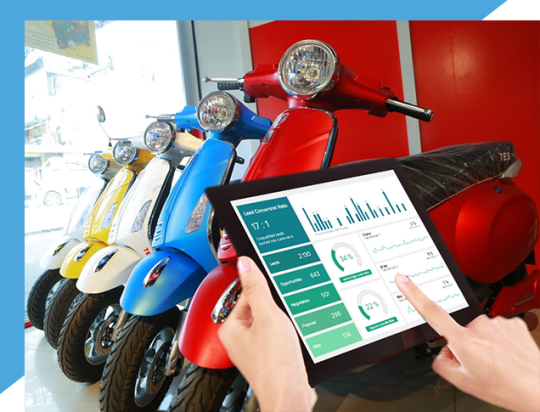#OrderManagementSystem
Explore tagged Tumblr posts
Text

0 notes
Text

Boost Your Business Efficiency with Smart Order Management Solutions
Unlocking a New Measure for Enhancing the Efficiency Level of Your Business through Order Management System.
Introduction:
Order management systems could be defined as an essential tool for Today’s fast moving business environment especially for those organisations which are in a constant search of business processes and solutions to help them fight the increasing competition, improve supply chain efficiency, and increase customer satisfaction. From order tracking to order fulfilment, an efficient OMS helps to achieve timely, error-free and streamlined process for every order.
What does Order Management mean?
OMS stands for Order Management System also a way that keep record of order right from the time it is ordered to the time it is shipped. It affords the businessperson the convenience of having to view orders, evaluate inventories, and process payments on a single platform. It is significant for the companies such as retail, e-commerce, food delivery services, and logistics – the companies for which order delivery time is decisive.
But why is Order Management important?
Long term and effective order management also helps in the reduction of manual interferences, including errors that may prevail in the procedure as well as to increase the speed at which orders are fulfilled. Here’s how it can benefit your business:
• Real-time Order Tracking: Anytime you should know the state of every order.
• Faster Order Processing: Optimization of all these processes increases rates of delivery.
• Reduced Errors: Automating reduces risk of keying in wrong figures the idea being pushed here by this strategy is that with full automation there is no possibility for keyed in wrong figures.
• Improved Customer Experience: Inform customers and give them accurate delivery time of the products to be delivered to them.
• Better Inventory Control: It eliminates cases of stock outs and cases where a company holds too many stocks. Updated Order Management System Characteristics
1. Order Tracking: Real time visibility of order status. 2. Inventory Management: Notifications of real time availability of stock. 3. Multi-Channel Integration: Web-based orders, sometimes marketplace orders, and POS orders are taken from customers. 4. Payment Processing: Safe payment channels to enhance buyer’s experience. 5. Custom Reporting: Prepare performance report on sales, returns, and order.
Conclusion:
Effective Order Management System, can mean all the difference in the growth of your business and customer satisfaction. Automating the manual business processes benefits both; the employees and the customers since acquiring the proper software eliminates mistakes, enhances the shopping experience. If you are looking to improve efficiency look no further as we have curated the newest Order Management Software out in the market.
Call-to-Action (CTA):
Are you in search of an effective and convenient Order Management System? Find the Best Order Management Solution Now.
#ordermanagement#ordermanagementsystem#oms#ordertracking#orderprocessing#orderfulfillment#smartordermanagement#cloudordermanagement#orderautomation#inventoryandorders#restosoftin
1 note
·
View note
Text
Boost your business efficiency with Ordazzle’s innovative solutions. Simplify operations, enhance inventory management, and drive growth seamlessly. Achieve success with tools designed to optimize performance and meet your e-commerce needs effortlessly.
0 notes
Text
I built an E-commerce website & API with Nodejs, Express and MongoDB with customizations

Free Live Demo: https://www.letscms.com/product/node.js-for-ecommerce-website-development
An eCommerce website built with Node.js, Express, and MongoDB is a web application designed to facilitate online shopping, where users can browse products, add items to their cart, place orders, and make payments. The website typically has a backend API developed using Node.js and Express, with MongoDB as the database to store and manage data.
Key Components: Node.js: A JavaScript runtime that allows you to build server-side applications. It’s known for its non-blocking, event-driven architecture, making it suitable for building scalable web applications, including eCommerce platforms. Express.js: A lightweight and flexible Node.js framework that provides robust features for building web applications. It simplifies the development of server-side logic, routing, and middleware integration. MongoDB: A NoSQL database that stores data in a flexible, JSON-like format called BSON. MongoDB is well-suited for eCommerce platforms because it can handle large amounts of unstructured data, such as product details, user information, and order histories.
Contact Information: Skype: jks0586 WhatsApp | Call: +919717478599 Email: [email protected] | [email protected] Websites: www.letscms.com | www.mlmtrees.com Support: 24x7
#NodejsEcommerceDevelopment#ExpressjsOnlineStore#MongoDBforEcommerce#CustomEcommercePlatform#NodejsShoppingCart#EcommerceAPIIntegration#ProductCatalogManagement#SecureUserAuthentication#PaymentGatewayIntegration#EcommerceAdminPanel#RESTfulAPIforEcommerce#ScalableEcommerceSolutions#CustomizableEcommerceWebsite#OrderManagementSystem#NodejsWebDevelopment#AffordableMlmBusinessSoftware#MLMBusinessWebsite#CustomMLMSoftware#MLMSoftwareDevelopment#BinaryMLMPlan#UnilevelMLMPlan#MonolineMLMPlan#MlmUserDashboard#GenealogyTree#MlmCommissionManagement#CheapMLMSoftware#MLMWebsite#NetworkMarketing#Ewallet#CommissionManagement
1 note
·
View note
Text

Reasons Why You Need an Order Management System
1 note
·
View note
Text

Title - DMS for EV Manufacturers vs. Generic Distribution Management Systems
Distribution Management Systems (DMS) are powerful tools that help optimize and streamline distribution processes for different industries. In particular, DMS plays a crucial role in two specific domains: Electric Vehicle (EV) manufacturing and Business-to-Business (B2B) operations. While they share the goal of efficient distribution management, DMS for EV manufacturers and DMS for B2B businesses have distinct features tailored to their respective industries.
DMS for EV manufacturers are designed to address the unique challenges faced in the rapidly evolving EV market. These systems provide functionalities such as real-time inventory tracking, optimized charging station allocation, and intelligent routing for EV deliveries. With the growth of the EV industry and the increasing demand for electric vehicles, DMS for EV manufacturers have become essential tools for managing the complexities of logistics, inventory, and efficient vehicle delivery.
On the other hand, DMS for B2B businesses are focused on optimizing distribution processes for a variety of products and services. These systems offer features such as order management, inventory control, supply chain visibility, and integration with other business systems. They help B2B businesses streamline their operations, improve order fulfillment, enhance inventory accuracy, and ensure efficient supply chain coordination.
While both DMS for EV manufacturers and DMS for B2B businesses aim to improve distribution efficiency, they are tailored to meet the specific needs of their respective industries. By selecting the right DMS, EV manufacturers and B2B businesses can enhance their distribution strategies, reduce costs, increase customer satisfaction, and gain a competitive advantage in their markets.
Understanding the distinctions and benefits of DMS for EV manufacturers and DMS for B2B businesses is crucial for organizations seeking to optimize their distribution management processes and stay ahead in their respective industries.
Evolution of DMS for EV Manufacturers
The evolution of Distribution Management Systems (DMS) for Electric Vehicle (EV) manufacturers has witnessed significant advancements in response to the growing complexity and demands of the EV industry. As the industry continues to evolve, DMS solutions have adapted and improved to meet the specific needs of EV manufacturers. Here is an overview of the evolution of DMS for EV manufacturers:
Early Stages: In the early stages of the EV industry, DMS solutions focused on basic inventory management, order processing, and logistics coordination. The emphasis was on streamlining internal operations and ensuring timely delivery of EVs.
Integration of Charging Infrastructure: As the charging infrastructure for EVs expanded, DMS solutions evolved to incorporate functionalities related to managing and optimizing charging stations. This included features such as tracking charging sessions, monitoring charging station availability, and optimizing charging station allocation based on demand and capacity.
Real-time Data and Analytics: With advancements in technology and connectivity, DMS for EV manufacturers began offering real-time data and analytics capabilities. This allowed manufacturers to track inventory levels, monitor vehicle movements, and analyze distribution patterns in real-time. Real-time data and analytics facilitated better decision-making, improved inventory management, and enhanced overall distribution efficiency.
Intelligent Routing and Optimization: The evolution of DMS for EV manufacturers introduced intelligent routing and optimization capabilities. These features utilized algorithms and data analysis to optimize delivery routes, considering factors such as traffic conditions, charging station availability, and customer preferences. Intelligent routing improved delivery efficiency, reduced costs, and enhanced customer satisfaction.
Integration with IoT and AI: The integration of Internet of Things (IoT) technology and artificial intelligence (AI) has further shaped the evolution of DMS for EV manufacturers. IoT connectivity enables real-time monitoring of EV performance, charging status, and battery information, allowing for proactive maintenance and efficient resource allocation. AI-powered algorithms and predictive analytics provide insights for demand forecasting, inventory optimization, and route planning.
Future Trends: The future of DMS for EV manufacturers is likely to embrace emerging technologies such as machine learning, autonomous vehicles, and advanced predictive analytics. These advancements will enable even more efficient and automated distribution processes, precise demand forecasting, and adaptive routing strategies.
In summary, the evolution of DMS for EV manufacturers has seen a progression from basic inventory management to advanced analytics, intelligent routing, and integration with emerging technologies. The ongoing advancements in DMS solutions are crucial in supporting the growth of the EV industry, optimizing distribution processes, and ensuring efficient and sustainable EV transportation.
Impact on the DMS for EV Manufacturers writing industry
The impact of Distribution Management Systems (DMS) on the Electric Vehicle (EV) manufacturing industry has been significant, revolutionizing distribution processes and driving operational efficiency. Here are some key impacts of DMS on the EV manufacturing industry:
Streamlined Distribution Processes: DMS has enabled EV manufacturers to streamline their distribution processes, from inventory management to order processing and delivery. Real-time tracking of EV inventory, optimized routing, and efficient charging station allocation have improved the overall distribution efficiency, reducing lead times and enhancing customer satisfaction.
Enhanced Supply Chain Visibility: DMS provides EV manufacturers with real-time visibility into their supply chain, allowing them to track inventory levels, monitor order status, and identify potential bottlenecks. This visibility enables better inventory planning, reduces the risk of stock outs or excess inventory, and promotes efficient resource allocation.
Improved Operational Efficiency: The automation and optimization capabilities of DMS have significantly improved operational efficiency for EV manufacturers. Intelligent routing algorithms optimize delivery routes, reducing fuel consumption and transportation costs. Real-time data analytics and demand forecasting enable better production planning and inventory management, reducing waste and optimizing resource utilization.
Integration with Charging Infrastructure: DMS has played a crucial role in integrating and managing the charging infrastructure for EV manufacturers. By optimizing the allocation of charging stations, monitoring charging sessions, and analyzing charging patterns, DMS ensures efficient utilization of charging infrastructure, reduces wait times for EV owners, and promotes a seamless charging experience.
Scalability and Adaptability: DMS offers scalability and adaptability for EV manufacturers, accommodating the growth of their distribution networks and evolving market demands. As the EV industry expands, DMS can easily accommodate increased inventory volumes, additional charging stations, and complex logistics requirements, ensuring that distribution operations remain efficient and effective.
In summary, the impact of DMS on the EV manufacturing industry is profound. It has revolutionized distribution processes, enhanced supply chain visibility, improved operational efficiency, integrated charging infrastructure, and provided scalability for manufacturers. By leveraging the capabilities of DMS, EV manufacturers can meet the growing demands of the market, reduce costs, and deliver superior customer experiences.
Discuss emerging trends and technologies in distribution management, such as the integration of AI, IoT, and predictive analytics
Emerging trends and technologies in distribution management are transforming the way businesses handle logistics and supply chain operations. The integration of Artificial Intelligence (AI), Internet of Things (IoT), and predictive analytics has opened up new possibilities for optimizing distribution processes and improving overall efficiency.
AI brings advanced capabilities to distribution management by leveraging algorithms and machine learning techniques to analyze data and make intelligent decisions. It enables automated route optimization, demand forecasting, and inventory management, leading to cost reduction and improved customer service.
IoT plays a crucial role in distribution management by connecting devices and enabling real-time data collection. With IoT sensors and devices, businesses can track inventory levels, monitor vehicle performance, and even detect maintenance needs in real-time. This connectivity allows for proactive decision-making, efficient resource allocation, and enhanced visibility throughout the distribution network.
Predictive analytics utilizes historical data and statistical models to forecast future demand, optimize inventory levels, and anticipate supply chain disruptions. By leveraging these insights, businesses can make informed decisions, reduce stock outs, and ensure smooth distribution operations.
The integration of these technologies enables more proactive and data-driven decision-making in the distribution management system. It leads to optimized routing, improved inventory management, enhanced supply chain visibility, and better customer satisfaction. As these technologies continue to evolve, businesses can expect even more advanced solutions for managing their distribution processes effectively.
#Distributormanagementsystem#Dealermanagementsystem#Distributionerpsoftware#DemandPlanningSoftware#DistributionManagementSystem#Inventorymanagementsystem#ordermanagementsystem#routeoptimizationsoftware#warehousemanagementsystem#salesanddistributionmanagementsoftwareTelecom#Salesforceautomationforfmcgindustries#mobilebasedsalesforceautomationsoftware#distributionmanagementsoftwareindia#onlinedealershipmanagementsystem#DynamicSearchAds#Billingandstockmanagementsoftware#Saleanddistributionmanagement#distributormanagementsystemsoftware#b2borderingapp#evcrmdms
0 notes
Text
Why investing in warehouse inventory management software is a great idea?
As businesses take advantage of the Internet, they experience higher profits and orders from people worldwide. However, minus warehouse inventory management software, it is tough to streamline inventory.
With Inventory management software, it is easy to maintain production and manage customer orders and available inventory. Unless you have a small business, handling multiple SKUs and product diversity is challenging.

Is warehouse inventory management software worthwhile for your home?
Besides supporting better results and organization of products, warehouse inventory management softwarecan help to augment the operations of a small business.
Choosing the right Order Management System can help to track the company's inventory and sales. It also supports the employees by offering the best list, management, and control.
This offers employees sufficient information about the inventory type, numbers, etc. It also helps to keep the products organized and allows the business to manage its stocks. It also helps to track the overall inflow and outflow of the goods. Thus, it eliminates the need for frequent inspections or hiring highly qualified staff to manage business goals.
Other benefits of selecting the warehouse inventory management software
Top warehouse inventory management software helps businesses to monitor and improve their performance. It also helps to streamline business operations.
Such software helps to monitor the product from production to sale. This means that there are lower chances of loss and theft. You can install these in POS systems to process payments and identify fast and slow-moving items.
With a good Order Management System, it is easy to reduce internal inventory costs and establish productive relationships.
Inventory management software can reduce business costs by controlling over and under-stocking. With this, you can also control backorder costs.
Since companies keep their inventory in rented or leased storage spaces, overstock and understock can lead to direct losses. It also helps you to keep yourself prepared for the festival rush.
Also, it helps to control the insurance costs as you can eliminate the undesired product lines or high production costs and choose the best ones. This helps to increase the business profits and reduce fixed costs.
For original post visit: https://nboxoffice.com/why-investing-in-warehouse-inventory-management-software-is-a-great-idea/
0 notes
Text
𝗘𝗹𝗶𝗺𝗶𝗻𝗮𝘁𝗲 𝘁𝗵𝗲 𝗺𝗮𝗻𝘂𝗮𝗹 𝗽𝗿𝗼𝗰𝗲𝘀𝘀𝗲𝘀 𝗮𝗻𝗱 𝘀𝘁𝗿𝗲𝗮𝗺𝗹𝗶𝗻𝗲 𝘆𝗼𝘂𝗿 𝗯𝘂𝘀𝗶𝗻𝗲𝘀𝘀 𝗼𝗽𝗲𝗿𝗮𝘁𝗶𝗼𝗻𝘀 𝘄𝗶𝘁𝗵 𝗮𝘂𝘁𝗼𝗺𝗮𝘁𝗲𝗱 𝘄𝗼𝗿𝗸𝗳𝗹𝗼𝘄𝘀.
Book a demo or connect with us at [email protected] to revolutionize your business today!
#OrderManagementSystem#OMS#Fulfillor#InventoryManagement#OrderManagement#ShippingSolutions#Shipping#LogisticsManagement#Logistics





#order management system#warehousesystem#inventory software#inventorymanagement#warehouse management system
0 notes
Link

#ordermanagementautomation#manufacturingordermanagement#inventoryordermanagement#ordermanagementsystem
3 notes
·
View notes
Text
What is the biggest problem for multichannel ecommerce businesses?
One of the biggest problems for multichannel eCommerce businesses is managing inventory and order fulfilment across multiple channels. This can be challenging because each channel may have different inventory levels, shipping requirements, and fulfilment processes. In addition, it can be difficult to ensure consistent branding and customer experience across multiple channels, as each platform may have different design and layout options. Another challenge is managing customer service and returns across multiple channels, as customers may expect different levels of support and return policies may vary between platforms.

#inventory management system#ordermanagementsystem#multichannel inventory management#inventorymanagementsoftware#automatedinventorymanagement
0 notes
Text
Order Management System

mSELL produces personalised automation software to optimise your business with order management system It simplifies your sales process, manages time, and optimises the entire sales & ordering process. Our Order Management System boosts both time efficiency & cost efficiency of your company and that directly doubles your rewards.
0 notes
Link
Order Management Systems in Capital Markets | BFSI Testing
By ensuring assurance for sophisticated order management systems in capital markets, all their processes, features, and functionalities across the front, middle, and back-office perform seamlessly.
0 notes
Text
In today’s fast-paced eCommerce landscape, ensuring order accuracy is critical for maintaining customer satisfaction and operational efficiency. With an increasing number of orders being placed across multiple channels, the challenge of managing these orders accurately can become overwhelming. This is where an Order Management System (OMS) steps in as a game-changer, helping businesses streamline operations, reduce errors, and enhance customer experience.
0 notes
Photo

Challenges in Order Management Software
One of the essential capabilities of eCommerce, supply chain, and logistics organizations' success is order management and fulfillment.
However, with so much emphasis on omnichannel selling, managing and fulfilling purchase requests from numerous channels has grown more challenging.
As a result, businesses are turning to order management software to help them streamline, automate, and improve the efficiency of their order fulfillment processes.
The software has a slew of advantages for both the company and its clients, including:
human operations are becoming automated
enhancing client happiness, giving the company more control over data, making data analysis easier, and accelerating order processing while eliminating costly errors
lowering expenses and facilitating access to information
Source: https://evincedev.com/blog/order-management-system/
0 notes
Link
SF Technologies partners with DAA! Integration of a customized order management system with tools to deliver quality customer service.
0 notes
Link
#Ecommerce continues to be a growing revenue source with sales projected to hit $6.388 billion in 2024. To keep up with demand, businesses need to optimize current tools and are turning to custom #EDI integrations to allow for more efficient and automated transactions. Check out our recent blog post and hear from our experts about EDI's numerous benefits and how #CustomSoftwareDevelopment can help enhance your e-commerce solutions today.
Link: https://bit.ly/3nZTICg
0 notes